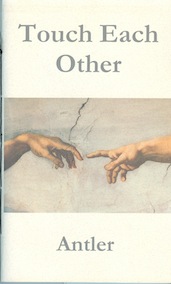Book Review
Antler, Touch Each Other, Kanona, NY: FootHills Publishing, 2013
by Charles Rossiter
Mentored and encouraged by Allen Ginsberg, Antler has appeared with major Beat writers on panels and at symposia around the country and internationally. He is one of Wisconsin's most widely recognized and highly regarded poets who travels widely giving readings and workshops, and he served as Milwaukee poet laureate, 2002-2003. Yet, he has not published a book since his Selected Poems from Soft Skull Press back in 2000. Therefore, it is especially good to have this new work in hand.
I appreciate the poems in Touch Each Other, in part, because I appreciate Antler's varied interests. As he notes on his website, he is an “explorer of wilderness without and within.” As a poet of wonder he is drawn to metaphysical questions, the answers to which we can only guess because, by definition, the answers are not empirically verifiable. What, he asks in one poem, does a baby know before it is born and what might we know after we're dead? In another he asserts that
A baby inside its mother
doesn't have to believe
it's inside its mother
to be born.
In fact, he goes on to say, a baby doesn't have to believe in anything to be born. Birth happens—one night in the womb, the next night nursing in its mother's arms. Considering death he asserts: “you get used to it” (after the first night like a kid at camp who makes new friends and stops being homesick).
He is also outspoken on social issues, against war and for gay rights, in poems such as “Don't Ask Don't Tell” and “Keepers of the Flame vs. Keepers of the Blowjob.” His utopian idealism is on display in “Redressing the Balance” (which appeared in Verse Wisconsin Online #110). In that poem he depicts a world with too much emphasis on “selling one's time,” “speed at all costs,” and “planned obsolescence” echoing concerns addressed in his great long poem, “Factory.” In “Prove to Me” he asks:
Why can't I fill my cart with food
and after the girl rings up my bill
give her a pine cone?
Sometimes, as in this poem, there is a delightful yin-yang quality. A serious issue is addressed, but with a twinkle in the eye.
Stepping back from specific poems and issues, one can see Antler's as a life-loving consciousness in a constant state of wonder—observing, learning and making connections—a serious poet with a light touch. It is not uncommon for his connections with the natural world to reach into the spiritual. Starting with the observation that a baby robin consumes 14 feet of earthworms a day he reaches the point of wonder at the beauty of robin song and asks:
How many worms
do I need to eat
every day
before I can fly and sing?”
It's a perfectly logical question if your consciousness is sufficiently expansive.
Stylistically, Antler's long flowing lines and easy natural rhythms echo Whitman and Ginsberg, his poetic forefathers, and in many ways, so does his subject matter, and that's all to the good. In summary, I happily recommend this thought-provoking, insightful, beautifully produced, hand-sewn chapbook from FootHills Publishing, a small literary press in upstate New York.


